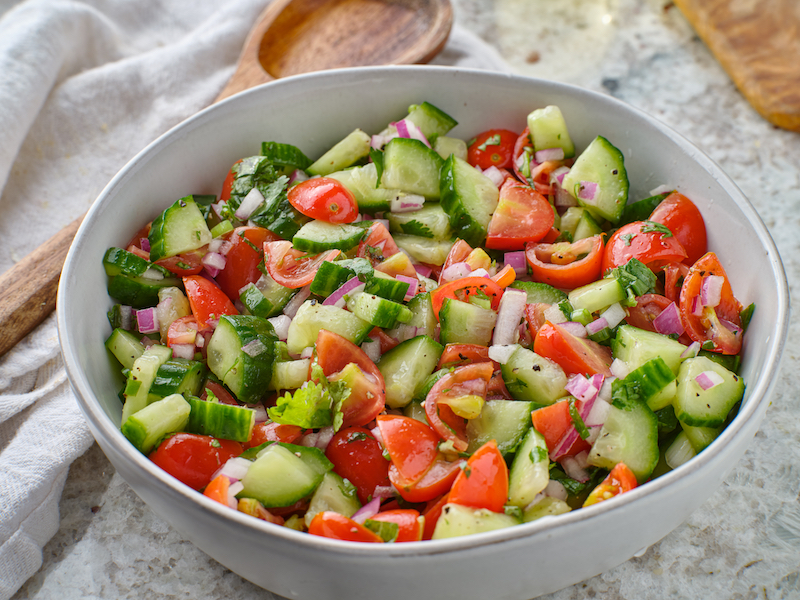The Role of Israeli Salad in Jewish Cuisine
Israeli salad is a fresh and colorful dish, typical of Kosher food and known for its vibrant mix of finely chopped vegetables. It’s an essential element of the Israeli breakfast, but it’s also served as a side dish or appetizer at other meals of the day. Its simplicity, combined with the freshness of the ingredients, makes it a beloved dish both locally and internationally.
What Ingredients Are in the Traditional Israeli Salad Recipe?
The original recipe for Israeli salad includes tomatoes, cucumbers, oil, salt, and lemon juice. The addition of onions (usually sweet or red, for a less overpowering taste) is also common.
The vegetables are cut into very small pieces, almost diced, to create a uniform texture that is pleasant on the palate. The small size of the pieces allows for the enjoyment of all ingredients in a single bite, emphasizing the blend of flavors.
The salad is then simply yet effectively dressed with olive oil, lemon juice, salt, and sometimes pepper, to enhance the natural flavor of the vegetables without overwhelming them. In some variations, a touch of fresh mint or parsley may be added to further enrich the taste.
Despite the basic recipe being relatively simple, there are numerous variations of Israeli salad. Some may include avocado for a touch of creaminess, or green peppers to add a bit of crunch and a stronger flavor.
Those who enjoy a kosher version of Greek salad might consider adding a cheese like feta, for a richer recipe with a more pronounced salty component.
Israeli salad is indeed a versatile recipe that lends itself to many variations. Feel free to add or substitute ingredients according to seasonal availability or your personal preferences. Remember, the secret to a good Israeli salad lies in the quality of the vegetables and the simplicity of the dressing, principles at the heart of kosher food.
How to Prepare Israeli Salad
Israeli salad is not only appreciated for its fresh, light taste but also for its nutritional value, being rich in vitamins, minerals, and fibers. It exemplifies the Israeli cuisine trend of including plentiful fresh vegetable portions in meals, with an overall approach that emphasizes fresh, seasonal ingredients.
We will now guide you through the preparation of a perfect Israeli salad. This dish, a symbol of kosher food, stands out for its simplicity and its ability to bring the vibrant flavors of the Middle East to your table. Its recipe is so simple it does not require participation in cooking classes or long and complex preparations.
Perfect as an appetizer, side dish, or healthy snack, the Israeli salad is an explosion of colors and freshness that is a must-have in your summer diet.
Necessary Ingredients (serves 4)
For 4 servings, you will need:
- 400g of ripe tomatoes.
- 400g of cucumbers.
- 1 medium red onion (optional).
- Juice of 1 fresh lemon.
- 3 tablespoons of extra virgin olive oil.
- Salt and black pepper, to taste.
- A handful of fresh parsley (optional).
Preparation Instructions
- Preparing the Vegetables:
- Begin by washing the tomatoes and cucumbers thoroughly. Israeli salad shines for its freshness, so always choose high-quality, seasonal vegetables.
- Dry the vegetables with a clean cloth or kitchen paper.
- Cutting:
- Dice the tomatoes. The size depends on your preference, but traditionally they should be quite small.
- Peel the cucumber (optional, some variations include the peel for extra crunchiness) and dice it similarly to the tomatoes.
- Finely slice the red onion. If you prefer a less sharp taste, you can soak the onion slices in cold water for a few minutes before adding them to the salad.
- Israeli Salad Dressing:
- In a small bowl, combine fresh lemon juice with extra virgin olive oil. Add freshly ground black pepper and salt to taste. Mix well to emulsify.
- Assembling the Salad:
- Place the chopped vegetables in a bowl and add the dressing. If desired, also incorporate chopped fresh parsley for an extra touch of color and freshness.
- Gently mix the salad to ensure all the vegetables are well coated.
- Resting and Serving:
- Allow the salad to rest in the refrigerator for about 15-30 minutes before serving. This allows the flavors to blend perfectly.
- Serve the salad fresh as the opening of a meal or as an accompaniment to main dishes.
Nutrition and Health: Benefits of a Kosher Breakfast with Israeli Salad
A kosher breakfast featuring Israeli salad can become a cornerstone of nutrition and health, ensuring an energetic and healthy start to the day. This morning meal, rooted in Jewish dietary traditions, not only adheres to the laws of Kashrut but also promotes a daily diet of rich, nutrient-dense foods. Indeed, a kosher dish like this, with its abundant mix of fresh vegetables, provides a burst of vitamins, minerals, and antioxidants, essential for combating stress and strengthening the immune system.
The kosher food rules, with their emphasis on the selection and preparation of food, encourage the consumption of nutrient-rich, low-saturated fat, and artificial additive-free dishes. Such a diet not only helps build a healthier eating regime but also fosters a greater awareness of what we eat and how our food is processed. Regularly including kosher foods in your diet can be a significant step towards improving diet quality and promoting a healthier lifestyle.
Starting the day with a kosher breakfast enriched by Israeli salad also ensures the intake of dietary fibers, crucial for optimal digestion and maintaining stable blood sugar levels, avoiding insulin spikes that can lead to fatigue and lethargy throughout the day. Meanwhile, the olive oil and lemon juice used in the dressing contribute healthy fats and vitamin C, which promote iron absorption and skin health.























